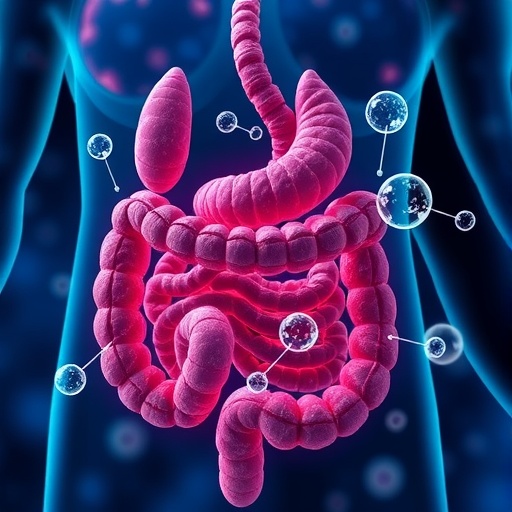In a groundbreaking study poised to reshape our understanding of medication impacts on human health, researchers have unveiled compelling evidence that common prescription drugs can significantly alter the gut microbiome and, consequently, influence susceptibility to intestinal infections. This research, encompassing a massive cohort of over one million individuals tracked meticulously for 15 years, sheds light on the intricate interplay between pharmaceutical agents and the complex microbial ecosystems residing in our intestines. Most striking among the findings is the identification of cardiac glycosides, specifically digoxin, as key modulators of gut microbial composition and infection risk, most notably with the notorious pathogen Salmonella enterica serovar Typhimurium.
The study confronts a paradox inherent in modern healthcare: while prescription drugs are essential for managing chronic and acute diseases, they may inadvertently undermine gastrointestinal integrity and immune defense. Non-antibiotic medications, long overlooked in microbiome research, emerged as substantial contributors to disrupted microbial balance and increased infection risk. This revelation challenges the previously narrow focus on antibiotics as the primary drug class influencing gut flora, broadening scientific and clinical horizons to incorporate a diverse array of pharmacological agents.
Leveraging an unprecedentedly large epidemiological dataset, the researchers mapped medication usage patterns against gastrointestinal infection incidences, revealing statistically significant associations. Among these, digoxin—a cardiac glycoside widely prescribed for heart failure and arrhythmias—stood out for its robust correlation with elevated rates of Salmonella infections. This association prompted deeper experimental inquiries, bridging population-level insights with mechanistic explorations in murine models.
.adsslot_6YGnth4Fz9{ width:728px !important; height:90px !important; }
@media (max-width:1199px) { .adsslot_6YGnth4Fz9{ width:468px !important; height:60px !important; } }
@media (max-width:767px) { .adsslot_6YGnth4Fz9{ width:320px !important; height:50px !important; } }
ADVERTISEMENT
Experimental follow-ups confirmed that digoxin administration in mice leads to marked alterations in the gut microbiome’s architecture. Detailed microbial sequencing and compositional analyses showed shifts favoring taxa that could compromise colonization resistance against invasive pathogens like Salmonella Typhimurium. Furthermore, this microbiome remodeling translated into increased pathogen burden and worsened disease outcomes, firmly linking digoxin’s microbiome-modulating effects with tangible infection susceptibility.
Intriguingly, the study uncovered that the digoxin-affected microbial community itself could transmit the enhanced infection risk to naïve hosts. Through fecal microbiota transplantation experiments, recipient mice exhibited similar susceptibility to Salmonella infection, underscoring the microbiome-mediated nature of this risk. This transmissibility underscores a pivotal paradigm: drugs can sculpt not just individual microbiomes but also potentially influence microbiome-driven disease dynamics across populations.
Delving into the molecular underpinnings of these phenomena, the researchers identified a digoxin-responsive β-defensin—a specialized antimicrobial peptide integral to mucosal immunity. This peptide appears to orchestrate changes in the microbial community, presumably by selectively pressuring certain bacterial populations. The modulation of this β-defensin by digoxin highlights an elegant drug-host-microbiome crosstalk, wherein a pharmaceutical agent alters immune effector expression profiles, culminating in downstream microbial shifts and altered pathogen defense.
The modulation of immune surveillance mechanisms by digoxin-responsive β-defensins not only exemplifies the complexity of host–microbiome interactions but also offers a mechanistic anchor explaining how systemic medications can exert localized and profound effects within the gut ecosystem. These findings stimulate fresh avenues for therapeutic intervention, suggesting that managing or mitigating drug-induced microbiome dysbiosis could become an integral part of preventing infection in vulnerable populations.
This research illustrates the power of integrating large-scale epidemiological data with rigorous mechanistic experimentation. By navigating seamlessly from human cohort analyses to controlled animal models, the investigators forged a comprehensive narrative that connects prescription drug consumption with microbial and immune alterations culminating in infection susceptibility. Such multi-disciplinary approaches are essential for unraveling the multifaceted interactions defining human health in an era dominated by polypharmacy.
The implications of these findings are profound. They urge clinicians and researchers alike to reconsider the collateral consequences of non-antibiotic medication use on the microbiome and to acknowledge that drug safety evaluations should encompass effects on microbial communities and consequent infection risks. This may prompt the development of microbiome-aware prescribing guidelines and foster innovation in co-therapies aimed at preserving gut homeostasis during necessary drug treatments.
Moreover, the identification of specific molecular players, such as the digoxin-responsive β-defensin, paves the way for precision medicine strategies targeting immune and microbial pathways. Therapeutic modulation of β-defensin expression or function could potentially restore microbiome balance and enhance resistance to enteric pathogens without compromising the primary therapeutic benefits of cardiac glycosides or other implicated drugs.
As the global burden of infectious diseases and chronic medication use continues to climb, understanding and mitigating unintended microbiome-drug-pathogen interactions takes on critical urgency. This study heralds a new chapter in microbiome research, emphasizing not only the microbial response to antibiotics but also how a broader spectrum of commonly used drugs reshapes interkingdom dynamics within the gut.
The convergence of epidemiology, microbiology, immunology, and pharmacology embodied in this research exemplifies the future of translational science—where population health insights fuel bench discoveries, and experimental findings inform clinical decision-making. This holistic perspective is indispensable for anticipating and circumventing adverse outcomes born of the intricate, often unanticipated consequences of modern therapeutics.
In conclusion, the identification of medication–microbiome interactions impacting gut infection risk unveils a critical dimension of drug effects that demands further exploration and clinical consideration. By dissecting the role of digoxin and other drugs in shaping microbial landscapes and immune defenses, this study not only enhances scientific understanding but also offers actionable knowledge to safeguard health in an era marked by widespread medication use and microbial complexity.
Subject of Research: Medication–microbiome interactions and their effect on gut infection risk
Article Title: Identification of medication–microbiome interactions that affect gut infection
Article References:
Kumar, A., Sun, R., Habib, B. et al. Identification of medication–microbiome interactions that affect gut infection.
Nature (2025). https://doi.org/10.1038/s41586-025-09273-8
Image Credits: AI Generated
Tags: cardiac glycosides and gut healthchronic disease management and gut integritydrug-induced changes in gut floraepidemiological study on gut healthgut infections and prescription drugsintestinal infection risk factorsmedication effects on gut microbiomemicrobiome research beyond antibioticsnon-antibiotic medications microbiome disruptionpharmaceutical agents and microbial ecosystemsSalmonella enterica and medication impactunderstanding gut health and medication interactions





